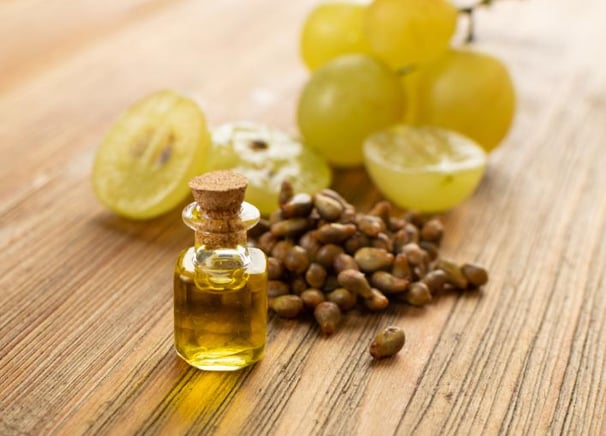Discover our NATURAL SKINCARE PRODUCTS, shop now!
Pure Natural Ingredients
Explore the benefits of our oils and their nourishing properties for your skin.
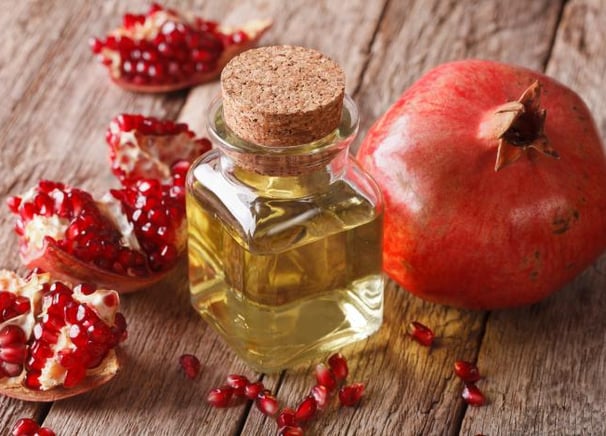

Pomegranate Seed Oil
(The Brightening Gem)
Pomegranate Seed Oil, derived from the seeds of the Punica granatum fruit, is a cherished ingredient in natural skincare and haircare, revered for its remarkable regenerative and antioxidant properties. This precious oil, typically extracted through cold-pressing, boasts a unique fatty acid profile dominated by punicic acid (Omega-5 conjugated linolenic acid), which makes up a significant portion of its composition.
Beyond punicic acid, it contains other beneficial fatty acids like linoleic and oleic acids, alongside powerful antioxidants such as Vitamin E and polyphenols. These components collectively contribute to its wide array of benefits, often supported by scientific inquiry.
Research suggests Pomegranate Seed Oil plays a vital role in skin health. Studies indicate its ability to stimulate cellular regeneration, particularly accelerating keratinocyte division and promoting a thicker epidermis. Furthermore, its potent antioxidant and anti-inflammatory properties, attributed largely to punicic acid and tocopherols, help combat oxidative stress and soothe irritated skin. Clinical interest also lies in its potential to boost collagen production and improve skin elasticity, making it a valuable asset in addressing signs of aging. While comprehensive human trials on all benefits are ongoing, the unique composition of pomegranate seed oil points to its promising role in maintaining youthful, resilient skin.
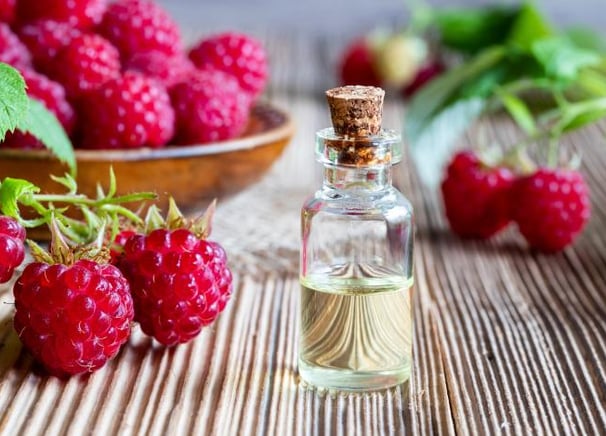

Raspberry Seed Oil, derived from the tiny seeds of Rubus idaeus (Red Raspberry), is a highly prized botanical oil, particularly in natural skincare. Extracted through cold-pressing, it boasts an exceptional nutritional profile that contributes to its potent skin-protective and nourishing qualities.
Its strength lies in its unique fatty acid composition, rich in Omega-3 alpha-linolenic acid (ALA) and Omega-6 linoleic acid. These essential fatty acids are crucial for maintaining a healthy skin barrier and reducing transepidermal water loss, thus keeping the skin hydrated and supple. Beyond its fatty acid content, Raspberry Seed Oil is a powerful antioxidant due to its high levels of Vitamin E (tocopherols and tocotrienols) and various carotenoids, including Vitamin A precursors.
Research highlights its significant anti-inflammatory properties, making it exceptionally soothing for irritated, sensitive, or compromised skin conditions like eczema, rosacea, and dermatitis. Studies have also pointed to its remarkable antioxidant capacity, which helps to scavenge free radicals and protect the skin from environmental stressors and oxidative damage. While not a standalone sunscreen, some investigations have explored its potential to absorb UV-B and UV-C rays, suggesting a supportive role in skin defense through its antioxidant and anti-inflammatory effects that mitigate sun-induced skin damage. This makes Raspberry Seed Oil an excellent choice for nurturing and defending the skin.
Raspberry Seed Oil
(The Regenerative Shield)
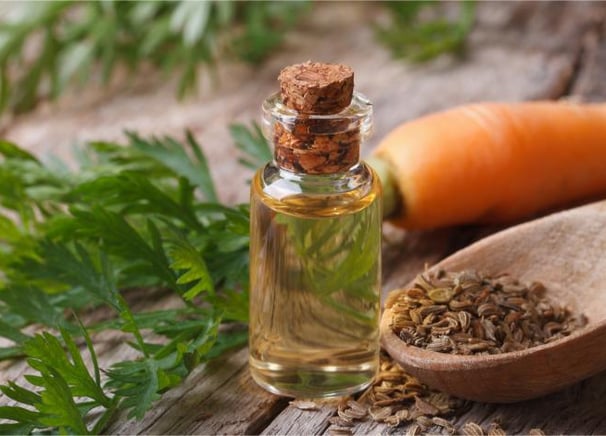

Carrot Seed Oil
(Natural Vitamin A for Renewal)
Carrot Seed Oil, extracted through cold-pressing from the nutrient-rich seeds of Daucus carota sativa, is a highly esteemed botanical oil in the realm of natural skincare. It stands out due to its impressive composition, which includes a high concentration of carotenoids, particularly beta-carotene (a vital precursor to Vitamin A), along with various tocopherols (forms of Vitamin E) and essential fatty acids such as oleic and linoleic acids. This unique blend of compounds imbues the oil with a potent array of skin-benefiting properties.
At its core, Carrot Seed Oil is celebrated for its remarkable antioxidant capabilities. These powerful antioxidants actively seek out and neutralize free radicals, which are unstable molecules generated by environmental stressors like UV radiation, pollution, and everyday cellular processes. By mitigating oxidative stress, the oil helps to protect the skin's integrity at a cellular level, thereby supporting its natural defenses against premature aging and environmental damage.
Scientific interest has consistently focused on its potential to support cellular regeneration and revitalization. Research into extracts from Daucus carota has demonstrated properties that promote healthy cell turnover, which is fundamental for maintaining a youthful and vibrant complexion. This regenerative action contributes to the oil's traditional use in improving overall skin tone and elasticity, leading to a more radiant appearance. Its nourishing qualities make it particularly beneficial for skin that appears dull, fatigued, or has been exposed to sun damage, helping to infuse life back into the complexion and soften the appearance of fine lines and wrinkles. While comprehensive human clinical trials on every specific benefit are continuously underway, the well-established properties of its key active compounds strongly underscore its traditional and growing recognition as a valuable ingredient for revitalizing, fortifying, and maintaining the skin's healthy state.


Jojoba Seed Oil
(The Balancing Base)
Jojoba Oil, derived from the seeds of the Simmondsia chinensis desert shrub through cold-pressing, holds a unique and highly valued position in skincare not as a true triglyceride oil, but as a liquid wax ester. This distinction is paramount, as its molecular structure bears an astonishing resemblance to human sebum, the natural oil produced by our skin. This remarkable biomimicry allows Jojoba Oil to be exceptionally compatible with virtually all skin types. Beyond its unique structure, it is also naturally rich in a full spectrum of tocopherols (Vitamin E), B-complex vitamins, and essential minerals such as silicon, chromium, copper, zinc, and iodine.
Its most celebrated property is its ability to regulate sebum production. When applied to oily skin, its similarity to sebum can "trick" the skin into believing it has produced enough oil, thereby helping to balance and reduce excessive sebum secretion. Conversely, for dry skin, it provides effective and lasting moisture without feeling heavy or greasy. This dual-action makes it an incredibly versatile moisturizer.
Numerous studies consistently confirm Jojoba Oil's non-comedogenic and hypoallergenic nature, meaning it is highly unlikely to clog pores or cause allergic reactions, making it an excellent choice even for individuals with acne-prone, sensitive, or reactive skin. Research has also illuminated its significant anti-inflammatory and antioxidant properties. Its anti-inflammatory compounds can effectively calm redness, soothe irritation, and alleviate discomfort often associated with conditions like eczema, psoriasis, and rosacea. The abundant Vitamin E content provides robust antioxidant protection against damaging free radicals and environmental aggressors, thereby supporting overall skin health and resilience. Furthermore, Jojoba Oil forms a lightweight, breathable, and protective layer on the skin's surface. This barrier effectively helps to reduce transepidermal water loss (TEWL), locking in essential moisture and reinforcing the skin's natural protective functions. Its exceptional stability against oxidation further solidifies its status as a foundational and highly effective ingredient in cosmetic formulations.
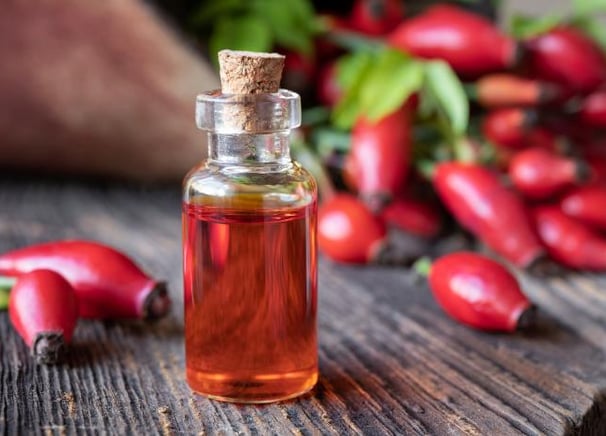

Rosehip Seed Oil
(The Repairing Powerhouse with Natural Retinoids)
Rosehip Seed Oil, cold-pressed exclusively from the seeds of the Rosa canina (or sometimes Rosa rubiginosa/moschata) rose bush, is an intensely powerful and revered botanical oil in the realm of natural and regenerative skincare. Its stellar reputation is largely built upon an extraordinary nutritional composition, making it a cornerstone for addressing various skin concerns, particularly those related to aging, damage, and uneven texture.
The oil is exceptionally high in essential fatty acids, primarily Omega-3 alpha-linolenic acid (typically constituting 30-35% of its profile) and Omega-6 linoleic acid (ranging from 40-45%). These vital components are indispensable for maintaining a healthy skin barrier, ensuring proper cell function, and contributing to overall skin integrity. Crucially, Rosehip Seed Oil is also one of nature's most significant sources of natural Vitamin A precursors, particularly trans-retinoic acid precursors. These compounds convert into retinoic acid within the skin, a form of retinoid well-known for its powerful skin-renewing benefits, yet often without the potential irritation sometimes associated with synthetic retinoids. Additionally, the oil contains Vitamin C, tocopherols (Vitamin E), and various other antioxidants and carotenoids.
Numerous clinical studies and extensive dermatological observations have consistently highlighted Rosehip Seed Oil's remarkable efficacy in improving the appearance of scars and stretch marks. Research has specifically demonstrated its ability to significantly reduce the visibility of both new and older scars, including surgical scars, as well as diminish the severity of stretch marks. Its rich blend of fatty acids and natural Vitamin A compounds collectively promote healthy skin regeneration, enhance elasticity, and aid in the remodeling of skin tissue.
Furthermore, its anti-aging prowess is well-documented. The natural retinoids present support healthy and accelerated cell turnover, which directly helps to reduce the appearance of fine lines, wrinkles, and age spots, leading to a smoother, more refined, and visibly more youthful complexion. Its regenerative properties also extend to fading hyperpigmentation, sun spots, and blemishes, contributing to a more even and radiant skin tone. Rosehip Seed Oil penetrates deeply to provide intense hydration, and its rich fatty acid profile profoundly enhances skin elasticity and suppleness. Its anti-inflammatory compounds further contribute to calming redness and irritation, making it a beneficial choice for sensitive or compromised skin. Consistent, regular use typically leads to improved skin texture, enhanced firmness, and an overall vibrant, healthy glow.


Sea Buckthorn Seed Oil
(The Nutrient-Dense Healer)
Sea Buckthorn Seed Oil, extracted specifically through cold-pressing from the tiny seeds of the Hippophae rhamnoides plant, stands as a formidable and intensely nourishing botanical oil in the realm of skin health. It is distinct from Sea Buckthorn pulp oil, which possesses a different fatty acid profile and often a more vibrant orange color due to higher carotenoid content. The seed oil is exceptionally rich in Omega-3 alpha-linolenic acid (ALA), often boasting a higher concentration than many other seed oils, alongside substantial amounts of Omega-6 linoleic acid and Omega-9 oleic acid. Beyond its robust fatty acid composition, it is a treasure trove of antioxidants, including very high levels of Vitamin E (comprising both tocopherols and tocotrienols), a diverse spectrum of carotenoids (such as beta-carotene), various phytosterols, and beneficial flavonoids.
This oil is globally recognized and extensively researched for its extraordinary regenerative and profound healing properties. Scientific studies have consistently indicated its remarkable ability to accelerate the repair and regeneration of skin tissue. This makes it particularly effective in soothing and rejuvenating compromised skin conditions, and it has been traditionally used and clinically investigated for its efficacy in managing concerns such as burns, wounds, eczema, dermatitis, and other forms of skin barrier disruption. Its powerful anti-inflammatory effects are a significant attribute, with its complex array of compounds actively helping to significantly calm redness, reduce swelling, and alleviate discomfort often associated with irritated and reactive skin.
The abundant antioxidant content within Sea Buckthorn Seed Oil provides a robust defense system against damaging free radicals that are generated by environmental aggressors like UV radiation and pollution. This strong antioxidant protection contributes to preventing premature skin aging and maintaining cellular integrity. Furthermore, research consistently highlights its role in strengthening and maintaining the skin's natural barrier function, leading to improved hydration retention and enhanced overall skin resilience. Its intense nourishing profile helps to replenish lipids, supporting a healthy and protective skin surface. Whether applied to address specific skin challenges like dryness and irritation, or simply as a potent ingredient for daily deep nourishment, Sea Buckthorn Seed Oil offers a comprehensive range of benefits for fostering exceptionally healthy, vibrant, and resilient skin.
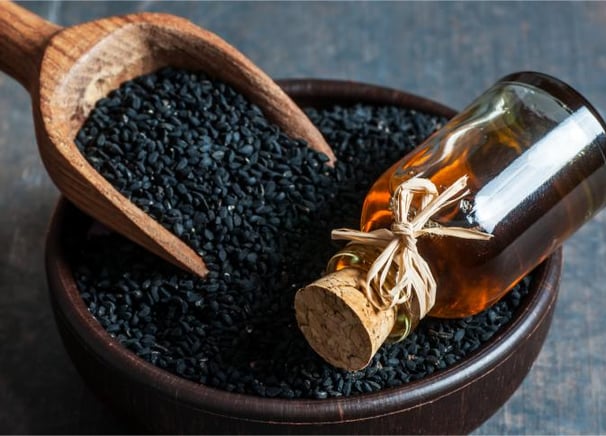

Black Cumin Seed Oil
(The Calming Purifier)
Black Cumin Seed Oil, cold-pressed from the potent seeds of Nigella sativa, commonly recognized as Black Seed Oil, is a globally revered botanical extract with a profound history in traditional medicinal systems such as Ayurveda, Unani, and traditional Arabic medicine. Modern scientific inquiry has increasingly validated many of its long-held traditional uses, particularly highlighting its immense benefits for skin health. Its powerful therapeutic properties are largely attributed to a complex array of bioactive compounds, with thymoquinone standing out as its primary and most extensively studied active component, alongside thymohydroquinone, thymol, nigellone, essential fatty acids like linoleic acid (Omega-6) and oleic acid (Omega-9), and various other antioxidants, vitamins, and minerals.
Numerous scientific studies, including extensive in vitro, in vivo, and a growing number of human clinical trials, have consistently confirmed Black Cumin Seed Oil's remarkable anti-inflammatory, potent antioxidant, and broad-spectrum antimicrobial (antibacterial, antiviral, and antifungal) properties. These powerful attributes make it exceptionally effective in addressing a wide range of common and persistent skin concerns.
Its anti-inflammatory capabilities render it particularly valuable for calming and soothing inflammatory skin conditions such as acne, eczema, psoriasis, and rosacea, by reducing redness, swelling, and overall discomfort. For blemish-prone skin, its antimicrobial effects help to curb the proliferation of acne-causing bacteria and promote a clearer complexion. The high concentration of thymoquinone and other antioxidants offers robust protection against free radical damage generated by environmental aggressors, thereby contributing to the prevention of premature skin aging and supporting cellular integrity. Furthermore, Black Cumin Seed Oil is traditionally utilized and has been explored in research for its role in promoting wound healing and reducing the appearance of scars, supporting the skin's natural repair mechanisms. It also contributes to balancing sebum production and purifying the skin, fostering an overall healthier and more resilient complexion.
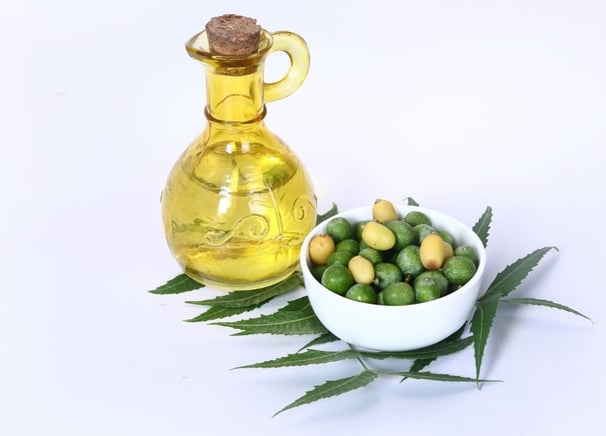

Neem Oil
(The Potent Protector)
Neem Oil, typically obtained through cold-pressing from the seeds and fruits of the sacred Azadirachta indica tree, is a powerhouse botanical ingredient deeply rooted in Ayurvedic medicine, where it has been utilized for millennia for its profound therapeutic properties. Its distinctive, pungent aroma belies a rich and complex array of active compounds, most notably azadirachtin (though its concentration can vary in cosmetic-grade oil), along with nimbin, nimbidin, nimbolide, nimbonone, and essential fatty acids like oleic, stearic, palmitic, and linoleic acids.
The oil's remarkable benefits are extensively supported by a vast body of scientific research, which consistently confirms its potent antiseptic, antibacterial, antifungal, anti-inflammatory, and even antiviral activities. These broad-spectrum antimicrobial properties make it an exceptionally effective natural solution for managing a wide range of dermatological concerns.
For acne management, its strong antibacterial action directly targets acne-causing bacteria, while its anti-inflammatory properties help to significantly reduce the associated redness, swelling, and discomfort of breakouts. Individuals suffering from inflammatory skin conditions like eczema and psoriasis often find relief from Neem Oil; its anti-inflammatory effects help to calm irritated skin, alleviate itching, and its emollient properties provide deep moisturization for dry, flaky patches characteristic of these conditions. Due to its antifungal capabilities, it is traditionally used to address various fungal skin infections, promoting a healthier skin environment. Beyond its therapeutic actions, Neem Oil is also deeply nourishing and moisturizing, making it beneficial for very dry, cracked, or compromised skin. Its overall purifying effect contributes to a revitalized and healthier skin appearance. Its comprehensive spectrum of beneficial compounds positions Neem Oil as a potent and versatile natural remedy for promoting overall skin health and supporting various skin healing processes.
Squalane
(The Skin-Mimicking Moisturize)
Squalane Oil is a highly prized emollient in skincare, derived from plant sources such as olives. This saturated hydrocarbon is remarkably similar to squalene, a natural component of human sebum, but is much more stable against oxidation. Its unique molecular structure and inherent compatibility make it a highly effective and versatile ingredient suitable for almost all skin types.
As a potent moisturizer, Squalane Oil deeply hydrates the skin without leaving a greasy or heavy residue. Its biomimetic nature allows it to integrate seamlessly with the skin's natural lipids, thereby enhancing the skin's barrier function and reducing transepidermal water loss. Research highlights its non-comedogenic properties, confirming it won't clog pores, making it an excellent choice for individuals with oily, acne-prone, or sensitive skin. Studies also point to its gentle yet effective soothing action for irritated skin. Beyond hydration, Squalane acts as a powerful antioxidant, protecting skin from environmental aggressors and contributing to a reduction in the appearance of fine lines and wrinkles. Its exceptional stability also extends the shelf life of other more fragile oils when incorporated into blends, solidifying its role as a premium and highly effective skincare component.


Meadowfoam Seed Oil
(The Restorative Barrier)
Meadowfoam Seed Oil, cold-pressed from the seeds of the Limnanthes alba plant, is a unique and highly stable emollient prized in cosmetic formulations. Its distinction lies in its extraordinarily long-chain fatty acid profile, which includes eicosenoic acid, providing it with exceptional oxidative stability. This inherent stability means it resists rancidity better than many other oils, extending the shelf life of blends it's incorporated into.
On the skin, Meadowfoam Seed Oil offers a luxurious yet non-greasy feel. Research demonstrates its efficacy in forming a lightweight, protective barrier that effectively locks in moisture and prevents transepidermal water loss (TEWL). This makes it an excellent hydrator, keeping the skin soft, supple, and well-conditioned without clogging pores. Its emollient properties leave the skin feeling silky smooth. Beyond its moisturizing capabilities, its natural antioxidant content contributes to protecting the skin from environmental stressors. Meadowfoam Seed Oil's unique stability and superior moisturizing performance make it a valuable component for enhancing both product longevity and skin health.
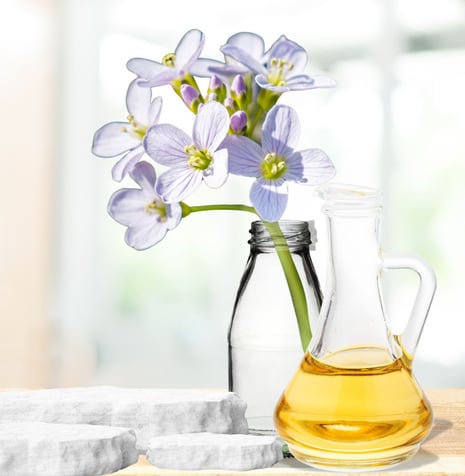

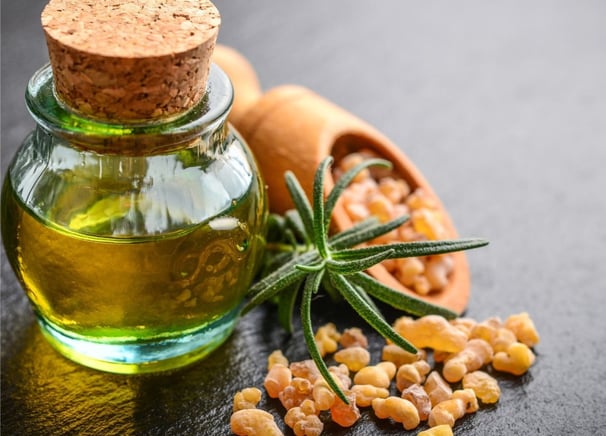

Frankincense Essential Oil
(The Rejuvenating Essence)
Frankincense Essential Oil, typically steam-distilled from the resin of Boswellia species (such as Boswellia carterii, serrata, or sacra), has been revered for millennia in various cultures for its profound therapeutic and cosmetic properties. Its complex chemical profile includes key constituents like alpha-pinene, limonene, and sabinene, which contribute to its distinctive aroma and powerful effects.
In skincare, Frankincense oil is highly regarded for its regenerative and rejuvenating qualities. Research suggests its ability to support skin cell turnover and promote a healthier complexion, aiding in the appearance of smoother, more even-toned skin. Its potent anti-inflammatory properties are a significant area of scientific interest, helping to calm redness, soothe irritation, and alleviate discomfort, making it beneficial for sensitive or compromised skin. Additionally, its natural astringent properties can help to tone the skin and minimize the appearance of pores. While not a direct anti-wrinkle agent, its regenerative and firming actions are often associated with reducing the visible signs of aging, such as fine lines and wrinkles, contributing to a more youthful and revitalized appearance.
Tea Tree Essential Oil
(The Blemish Fighter)
Tea Tree Oil, a powerful essential oil steam-distilled from the leaves of the Australian native Melaleuca alternifolia, is globally recognized for its exceptional purifying and therapeutic properties. Its primary active component, terpinen-4-ol, is largely responsible for its renowned efficacy, along with other compounds like cineole and gamma-terpinene.
Extensive scientific research has consistently validated Tea Tree Oil's potent antimicrobial actions, specifically its antibacterial, antifungal, and antiviral properties. This makes it an invaluable natural remedy for addressing a wide array of skin concerns. It is most famously used for treating acne and blemishes, as studies confirm its ability to effectively target acne-causing bacteria, reduce inflammation, and calm redness associated with breakouts. Beyond acne, its antiseptic qualities make it beneficial for soothing minor skin irritations, insect bites, and supporting the healing of small cuts or scrapes. It is also widely employed for scalp health, particularly in managing dandruff and flakiness due to its antifungal effects. Tea Tree Oil effectively purifies congested skin, promoting a clearer, healthier, and more balanced complexion. Its multifaceted antimicrobial and anti-inflammatory attributes firmly establish it as a versatile and essential ingredient in natural skincare.
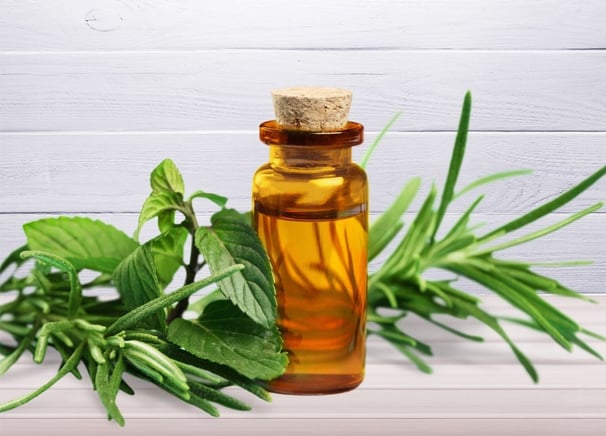

Grapeseed Oil
(The Lightweight Enhancer)
Grapeseed Oil, cold-pressed from the seeds of Vitis vinifera, is a remarkably versatile and lightweight oil widely used in skincare for its easily absorbed nature and beneficial properties. It stands out for its high concentration of Omega-6 linoleic acid, an essential fatty acid crucial for maintaining the skin's barrier function, along with a rich supply of Vitamin E and potent polyphenols, including proanthocyanidins.
Its non-comedogenic nature makes it an excellent choice for virtually all skin types, especially those prone to oiliness or breakouts, as it moisturizes without clogging pores. Research underscores its significant antioxidant capacity, which helps protect the skin from environmental free radical damage and oxidative stress. Its mild astringent properties can contribute to toning the skin and minimizing the appearance of pores. Furthermore, its anti-inflammatory compounds help soothe and calm irritated skin. Grapeseed Oil absorbs quickly, leaving the skin feeling soft, smooth, and nourished, making it an ideal carrier oil and a valuable standalone treatment for a balanced, protected complexion.
